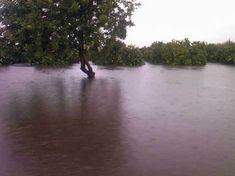
Heavy rainfall and flooding of Oliphants River in South Africa is disrupting citrus shipments and causing a tight supply situation on the UK market.
“We had two or three cold fronts at the beginning of last week that came together on June 8 with a tremendous downpour,” said Carl Opperman of Agri Wes Cape, the agriculture union of the Western Cape. “In 48 hours we had 140mm of rainfall in the western portion of the region. “Rivers overflowed and orchards in the citrus plain have been underwater. The reports from the disaster management team are that the river started to subside on Tuesday and we are hoping the orchards start to dry out. Many growers have not been able to get onto their land, which is knee-deep in water in some areas.”
Opperman estimated that picking would be interrupted in the affected area for about seven days.
Jacques Mouton of Afrifresh told FPJ that the supply chain will have to deal with a brief gap in sendings. “Packing will re-start in the last week of June with the first shipment by the beginning of July,” said Mouton. “The export season is expected to extend by a week, to end with Valencia in mid-September.”
Although the Western Cape is best known as a supplier to the US market, there is still disruption for the UK orange supply situation. “We have only just really got going with the season and it has been running late,” said Martin Dunnett of importer Capespan. “By June 2, only 800 pallets had been shipped compared to 3,500 pallets at the same point last year, so there were already some delays in exports. The Western Cape is not a big supplier to the UK, but frost in more northerly growing areas in the country two to three weeks ago is of concern because of potential damage to trees. And the Eastern Cape, which is a big supply area for the UK, is a high rainfall area anyway, and packing is being disrupted.”
Dunnett expects there will be definite supply issues. “The South Americans have had lots of bad weather too and European stocks are very depleted,” he said. “For example, count 48s in oranges are very short, and even 56s. It is a hot market and I see it continuing that way until mid-July.”
Opperman also indicated that packhouses in some table-grape growing areas had been completely flooded and that he had received reports of soil erosion in vineyards.



